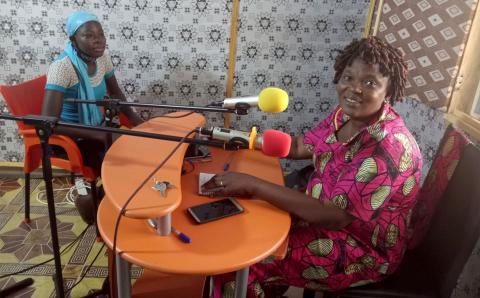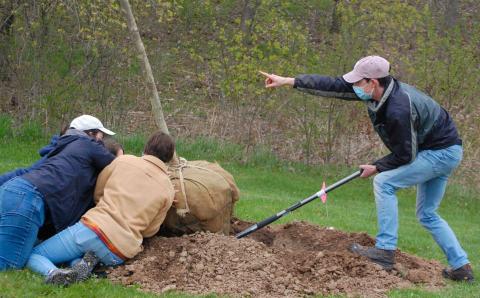I came to Massachusetts to get a master’s degree. It was the next step in what I had always hoped would be a fulfilling career in the mental health world. After my college years, I had worked in sales for a while, and I was ready to change direction. I had put it off for a while for all of the typical reasons, most notably because of the financial burden of graduate school. As many a poor, perfectionistic 20-something does, I floundered in the malaise of indecisiveness and insecurity for a few years, praying for a sign, and then one day I packed my bags and drove for 20 hours until I saw the Boston skyline.
To help pay for my schooling I found a job working with a middle-aged man named Doug Pacheco, who has Down syndrome. I have to admit it was a little intimidating, given that I had very little experience with developmental disabilities. But when I first met him, with his balding head, innocent smile, Wizard of Oz T-shirt, and rather unwieldy gait, it was easy to like him.
Being a philosophical 24-year-old product of skateboarding culture, I had long hair and a beard at the time. Doug has told me many times since that when he first met me, he thought I “looked like Jesus.” I had first met him at a restaurant on Boston’s North Shore, and for some reason, even years later, he likes to make fun of the fact that (in his opinion) I ate the restaurant’s entire supply of cornbread. “Remember? You kept shoving it in,” he has reminded me many times, making motions of someone pushing things into their mouth.
Down syndrome is a curious thing. After working every day for years now with someone who has it , I can say it is not what I thought it would be. When I tell people I work with people who have Down syndrome, they often make comments about the patience I must have. I have grown tired of those comments—not because the work does not require patience, but because it casts my work in a more negative light than I would prefer and makes me look like some sort of saintly Mother Teresa type.
I thank God for what he has taught me in my work with Doug, but I do not think the primary effect of that work has been to make me more patient. Rather, working with Doug has taught me what mercy looks like in action. It has forced into me a Spirit-wrought compassion I did not have before. It has compelled me to see great value and worth in the sort of person that is generally assigned less value by society, whether directly or indirectly. In the simple, habitual, day-to-day process of making his food, giving him medicine, helping him do laundry, and listening to his infinitely recycled jokes that he still finds just as funny, I learn what serving looks like: not the simple Christian idea of serving someone by doing good, but the sometimes mind-numbing and often menial tasks that make up what it looks like to serve someone who cannot do anything for you in return. In this way, there has been much for me to learn about mercy.
Doug is not one for long conversations, but he tries. He’ll ask me what I did today and how many classes I have even though he’s asked me the same questions every day for three months. He has a fascination with televangelist Joyce Meyer, whose program he often watches in the mornings. As a child, Doug was raised attending church services, which he still attends with his parents on Sundays.
In some of the moments we have together, I often will think about what God wants from Doug’s life. Although he is different, Doug still so surely bears the image of God, and the church cannot forget to honor that. I believe one day, when all this is over, Doug—like all of us—will be made whole in heaven. I cannot help but wonder what I would say to him then. Laying aside the “why” questions when it comes to Doug’s condition, there is so much to be gained from loving and caring for a person with Down syndrome. And that’s just who Doug is: he is a person, valuable in his own right, simply because of who he is. He is not defined by his disability and has no less worth in God’s sight. And he should have no less worth in our sight.
I did not meet Doug because I needed to learn something from him or because a disability is meant to serve some teaching or preparatory purpose. Even so, in the most unexpected ways, I truly believe working with him has changed me as a person and shaped me for my future work in mental health far more than my schooling did. This is not so much because of one experience as much as it is because of the fact that meeting him where he is every single day has required me to more deeply appreciate mercy and the need for it. There are days when working with him is incredibly difficult. There are days when I wish he was no longer limited by Down syndrome as he is. But in all of it, I think I understand Jesus better because of him. I understand more of what it means to see value in someone purely because of who they are and not because of what they can accomplish or how much they can benefit me or anyone else.
As a Christian I have the beautiful comfort of knowing that God shows mercy to me. But it cannot end there, because in Christ he calls me to radically show mercy to others.
I had thought I came to Boston to go to graduate school, and I had thought I took the job with Doug to help me pay for it. But years later, I have learned mercy from walking with Doug to the bus stop, from cleaning up shards of glass from some kitchenware that slipped from his hands, and from laughing at his same jokes that I have heard 10,000 times. I understand mercy better because of Doug Pacheco.
As Micah 6:8 famously reminds us, God desires that we should love mercy. Of all that I have learned in working with people with Down syndrome, it is that learning to love mercy rarely looks like what we expect it will.
About the Author
William B. Bowes is a mental health counselor and writer in Boston, Massachusetts and a graduate of Gordon Conwell Theological Seminary.







